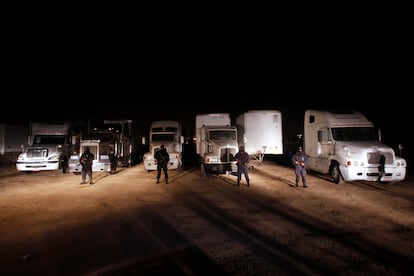Cargo theft in Mexico: a crime that’s costing lives and hundreds of millions of dollars
Crimes against truckers are on the rise, costing the country up to $300 million each year. A member of Congress has proposed an initiative that would create a specialized prosecutor’s office for this offense

Scattered among Mexico’s homicide and crime figures, there’s a group of victims who are now clamoring for the authorities’ attention: truckers. Every year, organized crime steals billions of pesos — or hundreds of millions of dollars — worth of cargo. What’s even more alarming is that these criminals do so with increasing violence. Given the deaths of drivers, the country is suffering from a deficit of workers, who no longer want to take the dangerous routes. Many Mexican truckers are migrating to the United States.
The economic losses — as well as the number of robberies of this type — are difficult to quantify, since the crime is underreported by the victims. The Association of National Transporters (ANTAC) estimates that cargo theft costs the country around 2.3 billion pesos each year — or $137 million — each year. However, Mexican businesspeople say that the true amount is far higher. According to the logistics company AI27, about $300 million worth of cargo is stolen each year. In 2022, the authorities recorded 13,199 crimes committed against truckers, which represents an increase of 6.7% compared to 2021.
The human cost is even more difficult to identify. Official figures don’t categorize homicides that were carried out as part of truck-jackings. But the scale is evident when taking into account that there is a deficit of 600,000 workers in the commercial transportation sector — fewer and fewer people want to take the wheel. David Estévez, the president of ANTAC, explained this to reporters during a protest held by truckers in front of the Senate last week. While the main reason for the demonstration was the rejection of a new tax being imposed on drivers, the issue of insecurity ended up taking center stage.
In Mexico, Estévez notes, more than half of the trailers and cargo trucks are operated by “truckmen” — drivers who are the owners of their vehicles and get contracts to ship goods. They’re different from members of commercial fleets, who are employed by companies.
It’s more difficult for freelance truckers to cover the growing security costs that large firms pay to protect their employees and their merchandise.
“Today’s challenges are dangerous. We’re dealing with crime on the roads. We have major problems in various parts of the country,” Estévez laments. Edomex — the state of Mexico, which consists of the areas that surround the capital — has the highest incidence of truck-jackings, followed by the states of Puebla, Guanajuato, Veracruz and Jalisco, in that order. “Unfortunately, other states are joining [the ranking],” he adds, such as Morelos, San Luis Potosí, Sonora and Chihuahua, “where we’re already beginning to see more violence on the highways.” Fearful of losing their lives, the truckers are migrating to the U.S. to work, Estévez notes.
The crimes usually occur when three or four cars surround a trailer while it’s being hauled along the road. The armed criminals point to the driver of the cargo transport, asking him to pull over. In some cases, they do it with shots in the air, or in the direction of the driver. Occasionally, the gangsters wear official uniforms and set up checkpoints, to disguise themselves as the authorities. In this way, it’s easier for them to get the drivers to stop.
Once surrounded, the driver is asked for key information, such as what kind of cargo he’s carrying, if the goods are equipped with tracking devices (GPS) and what the total value of the goods is, explains Luis Villatoro, director of security at Overhaul, a supply chain risk management company. “Depending on these characteristics, [the criminals] decide whether to take [the cargo] or not,” Villatoro says. “Later, they put the operator in the cabin, or tie him up in another vehicle.” On some occasions, the trucker is killed.
According to estimates by Christian Rauda — director of electronic tracking and logistics risk management at AI27 — the volume of assaults has been increasing in recent years. Rauda assures EL PAÍS that, in 2020, a cargo theft was reported on highways every five minutes. Last year, the average was one every two minutes. “In addition to volumetrics, violence has also been escalating,” Rauda warns. “Previously, the robbers would simply take the load and let the driver go. Today, they use violence [against the truckers], simply because they can do it without consequences.”
This is a crime of an economic nature, Villatoro explains. “Whoever finds a shipment of milk, for example, is going to steal it, because they’re going to [sell it off] very quickly in informal markets,” such as through street markets and social media. Motor transport moves 84% of the merchandise in Mexico — the rest is by rail. The trailers that cross the national territory carry goods such as wood, animal products, minerals, oil and industrial products.
Jorge Peñúñuri, president of the National Security and Justice Commission of the Employers’ Confederation of the Mexican Republic (Coparmex), discloses that his associates report the theft of merchandise as the top crime that they are victims of. “This is one of the most susceptible points for the business sector,” he emphasizes. The most stolen loads are food and groceries, followed by construction materials, auto parts, automotive spare parts and domestic appliances, according to data from Coparmex.
The situation has led a legislator from the ruling party, MORENA, to propose an initiative that would modify the law that governs the Attorney General’s Office (FGR) to create a specialized prosecutor’s office for this crime. The legislator for the state of Coahuila, Francisco Borrego, is also a businessman from the transport industry. “Some vehicles have been stolen from me. The truth is that my problem is with insurance, because it’s hard to get [the insurers] to pay me. When they do, it takes three, four months. I had to pay [bribes] to the [authorities] so that they would expedite the process of reporting the robbery.”
EL PAÍS asked Borrego if there’s collusion between the criminal groups and local and state authorities in places where cargo theft frequently occurs. “Of course!” Borrego replies over the phone. “There’s corruption at all three levels of government and it must end. We need the federal government — in this case, the President of the Republic — to stop and say that enough is enough.” Borrego’s proposal has been stalled in the Justice Commission of the Congress since June 6. He’s pushing for it to be debated in September.
Businesses are skeptical of Borrego’s proposal. “That prosecutor’s office has already existed — in one form or another — under different names,” says Rauda, from AI27. “The problem is that [the justice system] has never had the resources — or, as we say here in Mexico, enough teeth — to take all the necessary measures. So, even if [they create a new prosecutor’s office], it won’t have the necessary power to tackle the issue.”
Ideally, there would be specialized prosecutors for each crime, argues Peñúñuri, from Coparmex. “[Cargo theft] should be in the hands of experts and expert authorities. However, by creating a new prosecutor’s office, we could fall into a pothole, because of an insufficient budget, in adequate facilities, lack of training and professionalism.”
Sign up for our weekly newsletter to get more English-language news coverage from EL PAÍS USA Edition
Tu suscripción se está usando en otro dispositivo
¿Quieres añadir otro usuario a tu suscripción?
Si continúas leyendo en este dispositivo, no se podrá leer en el otro.
FlechaTu suscripción se está usando en otro dispositivo y solo puedes acceder a EL PAÍS desde un dispositivo a la vez.
Si quieres compartir tu cuenta, cambia tu suscripción a la modalidad Premium, así podrás añadir otro usuario. Cada uno accederá con su propia cuenta de email, lo que os permitirá personalizar vuestra experiencia en EL PAÍS.
¿Tienes una suscripción de empresa? Accede aquí para contratar más cuentas.
En el caso de no saber quién está usando tu cuenta, te recomendamos cambiar tu contraseña aquí.
Si decides continuar compartiendo tu cuenta, este mensaje se mostrará en tu dispositivo y en el de la otra persona que está usando tu cuenta de forma indefinida, afectando a tu experiencia de lectura. Puedes consultar aquí los términos y condiciones de la suscripción digital.









































